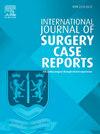Successful management of cesarean scar pregnancy progressive to placenta accreta spectrum: An uncommon condition in Vietnam and mini-review of the literature
IF 0.6
Q4 SURGERY
引用次数: 0
Abstract
Introduction and importance
Cesarean scar pregnancy (CSP) is an uncommon ectopic pregnancy that could be progressive to the placenta accreta spectrum (PAS). It is defined as abnormal trophoblast invasion of part or all of the placenta into the myometrium of the uterine wall, with varying degrees of severity. These abnormal pathologies of placental implantation could lead to life-threatening complications for pregnant women.
Case presentation
A 39-year-old female patient was transferred to our consultant hospital for the diagnosis of CSP at 6 weeks of gestational age (GA). Due to asymptomatic presentation, the patient requested continuing pregnancy despite the high risk of uterine rupture and massive hemorrhage. The pregnant woman was strictly monitored on clinical aspects and ultrasound findings. Noticely, the PAS was suspected at 15–16 weeks of GA, and PAS type percreta was diagnosed at 22 weeks of GA. However, the woman continued her pregnancy and a planned cesarean delivery was performed at 34 weeks 6 days of GA. Additionally, modified one-step conservative surgery (MOSCUS) was successfully applied for uterine preservation. The materno-fetal outcomes were favorable.
Clinical discussion
CSP is related to highly severe complications during pregnancy and the possibility of PAS. A timely termination of pregnancy ought to be discussed with the patient upon diagnosis. However, a proper management is more challenging for women desiring pregnancy.
Conclusion
A continuing pregnancy and strict monitoring with a multidisciplinary team could be considered if the patient refuses medical abortion in cases of CSP progressive to PAS. Further data is needed on this entity.
求助全文
约1分钟内获得全文
求助全文
来源期刊
CiteScore
1.10
自引率
0.00%
发文量
1116
审稿时长
46 days

 求助内容:
求助内容: 应助结果提醒方式:
应助结果提醒方式:


